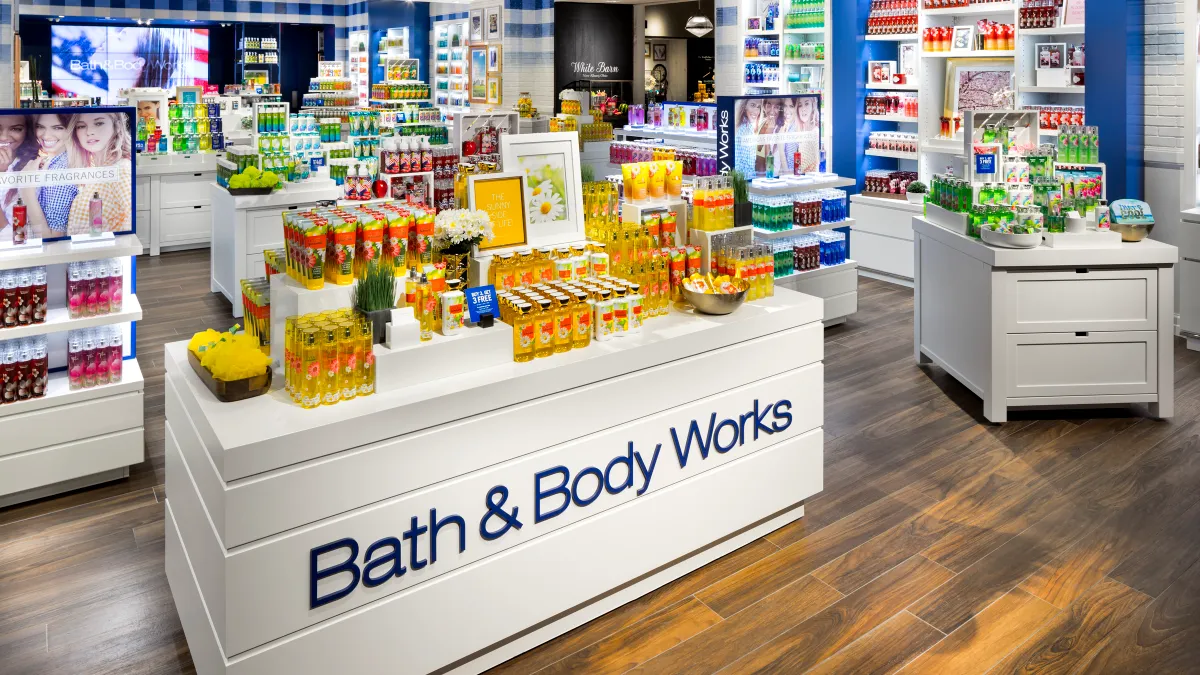Dive Brief:
-
L Brands on Tuesday announced it will cut 850 home office jobs or about 15% of that workforce, an effort to garner some $400 million in annualized cost savings, with $175 million achieved in fiscal 2020, according to a company press release. BMO Capital Markets analysts estimate the layoffs will drive about half that.
-
In focus is Victoria's Secret, where changes in "management structure and the labor model" will reduce store selling costs, the company said. Along with 250 previously announced Victoria's Secret store closures in North America, where negotiations with landlords for rent relief are ongoing, the company said it's also "working to reduce operating losses in the company-owned businesses in the U.K. and China."
-
The company said it's working with suppliers to manage inventory and reduce merchandise costs to boost margins at Victoria's Secret, a process that has already driven down spring inventory receipts by about 45%, with fall receipts expected to be down about 50% year over year.
Dive Insight:
After failing to close a previous deal with private equity firm Sycamore Partners to offload a 55% stake in its lingerie brand, L Brands appears to be embracing the idea of shrinking it in order to salvage it.
It's a strategy embraced by analysts at BMO Capital Markets, who said in emailed comments that "though one of the largest brands of all time," Victoria's Secret underearns precisely because it oversells, and therefore has "material opportunity to grow profits by shrinking revenues."
That would mean grappling with what has become an overly promotional habit at Victoria's Secret. L Brands founder and now ex-CEO Les Wexner at the company's annual shareholders meeting last year had described markdowns there as a merchandising failure, calling them "the largest expense we have."
"If markdowns go up or if turns slow down it means we're not tracking with the customer," he said then. "We have too many errors."
That seems to have been addressed, according to BMO research, which has "been flagging improving levels of promotional cadence for both brands," leading analysts to believe that higher merchandise margins are being achieved at both brands.
"Critically, on top of these SGA savings, we believe meaningful merch margin improvement has barely even begun," BMO Managing Director Simeon Siegel said.
While L Brands is taking actions that presumably may have been tackled by Sycamore if it hadn't backed out of its plan to acquire Victoria's Secret, the company reiterated Tuesday that it still plans to separate that business — collectively Victoria's Secret Lingerie, Victoria's Secret Beauty and PINK — from its better-performing, though smaller, Bath & Body Works personal care business. Analysts hailed that, with Wells Fargo Senior Analyst Ike Boruchow pinning Bath & Body Works' worth as a separate company at $11.7 billion.
That chain is doing better than most during the COVID-19 pandemic, which forced nonessential retailers to close for much of the first quarter. As of Tuesday, most stores of both retailers in North America have reopened, and sales at both "have been strong and have exceeded the company's expectations," per the release. Second quarter net sales are expected to be down about 20% compared year over year, reflecting an increase of about 10% at Bath & Body Works and a 40% or so decline at Victoria's Secret. The forecast beat previous estimates from Wells Fargo, BMO Capital Markets and Credit Suisse; analysts at Credit Suisse were expecting a 50% drop at Victoria's Secret.
The company didn't break out its e-commerce performance, except to say it was "up significantly" at both chains compared to last year, offset by a decline in store sales. Based on their previous conversations with L Brands executives, Credit Suisse analysts estimate that Bath & Body Works online sales grew nearly 200% in the first quarter, implying that stores were reopening at sales trends that were up about 50% year over year, but noted that some of that was "likely due to some level of 'pantry loading' of sanitizers as COVID cases started to surge in the US."
The company also told them that "new customer growth is increasing significantly, and non-sanitizer category growth is strong as well," which should help keep the brand's sales from going negative in the second half of the year "or even potentially against tough pandemic-driven compares in 2021," Credit Suisse analysts led by Michael Binetti said in emailed comments.
The company said its "cash and liquidity position also remains strong," with a cash balance, as of July 24, of more than $2.5 billion, with nothing drawn from its $1 billion asset-backed loan facility. That "liquidity should alleviate concerns," BMO's Siegel wrote.
















